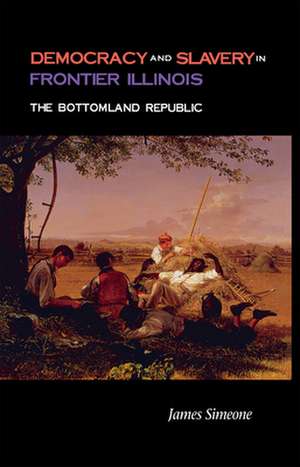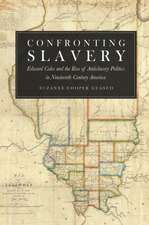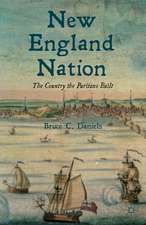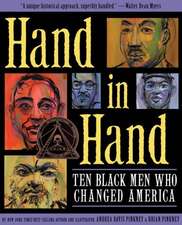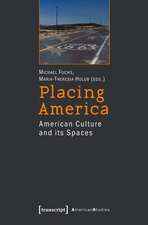Democracy and Slavery in Frontier Illinois: The Bottomland Republic
Autor James Simeoneen Limba Engleză Hardback – 10 aug 2000
During the 1820s, Illinois witnessed one of the earliest and most important battles between slavery and antislavery forces in the new American republic—one that unleashed riots, arson, and mob violence across the state. In this deeply researched and finely argued book, James Simeone contends that the contest over slavery in Illinois prefigured the course of national politics up to the Civil War, revealing the complexity of the slave problem in the early republic.
In attempting to bring slavery to a free state, white migrants from southern states hoped to create a Bottomland Republic of free and equal white yeoman farmers who could own slaves on the basis of "popular sovereignty." Abolitionists thus found themselves allied with the governing class of "aristocrats" against the upstart, proslavery migrants. The struggle permanently changed the state's political culture and foreshadowed the Democratic-Whig cleavage in antebellum politics by posing questions of regional and sectional identity, of the relation between republicanism and the market, and of the role of religion in public life.
Democracy and Slavery in Frontier Illinois reveals the paradoxes within the quest for a democracy that also fostered slavery. Placing early Illinois politics in the context of the national politics of the Jacksonian era, it will appeal to readers interested in the political development of the early republic and the midwestern frontier, the roles of race and class in constructing political identity, and the nature of liberal democracy in nineteenth-century America.
In attempting to bring slavery to a free state, white migrants from southern states hoped to create a Bottomland Republic of free and equal white yeoman farmers who could own slaves on the basis of "popular sovereignty." Abolitionists thus found themselves allied with the governing class of "aristocrats" against the upstart, proslavery migrants. The struggle permanently changed the state's political culture and foreshadowed the Democratic-Whig cleavage in antebellum politics by posing questions of regional and sectional identity, of the relation between republicanism and the market, and of the role of religion in public life.
Democracy and Slavery in Frontier Illinois reveals the paradoxes within the quest for a democracy that also fostered slavery. Placing early Illinois politics in the context of the national politics of the Jacksonian era, it will appeal to readers interested in the political development of the early republic and the midwestern frontier, the roles of race and class in constructing political identity, and the nature of liberal democracy in nineteenth-century America.
Preț: 386.21 lei
Nou
Puncte Express: 579
Preț estimativ în valută:
73.91€ • 80.26$ • 62.08£
73.91€ • 80.26$ • 62.08£
Carte tipărită la comandă
Livrare economică 23 aprilie-07 mai
Preluare comenzi: 021 569.72.76
Specificații
ISBN-13: 9780875802633
ISBN-10: 087580263X
Pagini: 299
Dimensiuni: 152 x 229 x 28 mm
Greutate: 0.64 kg
Ediția:1
Editura: Northern Illinois University Press
Colecția Northern Illinois University Press
ISBN-10: 087580263X
Pagini: 299
Dimensiuni: 152 x 229 x 28 mm
Greutate: 0.64 kg
Ediția:1
Editura: Northern Illinois University Press
Colecția Northern Illinois University Press
Recenzii
"An admirable contribution to our evolving understanding of American political development."—The Journal of American History
"A major contribution to the thorny subject of democracy and slavery in frontier Illinois."—Journal of the Illinois State Historical Society
"Provides bracing and sophisticated understandings of complex, unstably dynamic, and often paradoxical politics and politicized issues in early Illinois."—American Historical Review
"A major contribution to the thorny subject of democracy and slavery in frontier Illinois."—Journal of the Illinois State Historical Society
"Provides bracing and sophisticated understandings of complex, unstably dynamic, and often paradoxical politics and politicized issues in early Illinois."—American Historical Review
Cuprins
Table of Contents
Acknowledgments
Introduction: How the People Became the White Folks
1. The White Folks Challenge the Big Folks
2. Bottomland Farmers in the Market Revolution
3. Ninian Edwards in the Democratic Revolution
4. The Politics of Slavery in a Northern State
5. Organizing the People: Violence, Sectionalism, and Racism in the Counties
6. Whole-Hog Calvinists and Milk-and-Cider Arminians
7. Illinois and American Political Development
Conclusion: Democratic Identities and Liberal Institutions
Notes
Sources
Index
Introduction: How the People Became the White Folks
1. The White Folks Challenge the Big Folks
2. Bottomland Farmers in the Market Revolution
3. Ninian Edwards in the Democratic Revolution
4. The Politics of Slavery in a Northern State
5. Organizing the People: Violence, Sectionalism, and Racism in the Counties
6. Whole-Hog Calvinists and Milk-and-Cider Arminians
7. Illinois and American Political Development
Conclusion: Democratic Identities and Liberal Institutions
Notes
Sources
Index
Descriere
During the 1820s, Illinois witnessed one of the earliest and most important battles between slavery and antislavery forces in the new American republic—one that unleashed riots, arson, and mob violence across the state. In this deeply researched and finely argued book, James Simeone contends that the contest over slavery in Illinois prefigured the course of national politics up to the Civil War, revealing the complexity of the slave problem in the early republic.
In attempting to bring slavery to a free state, white migrants from southern states hoped to create a Bottomland Republic of free and equal white yeoman farmers who could own slaves on the basis of "popular sovereignty." Abolitionists thus found themselves allied with the governing class of "aristocrats" against the upstart, proslavery migrants. The struggle permanently changed the state's political culture and foreshadowed the Democratic-Whig cleavage in antebellum politics by posing questions of regional and sectional identity, of the relation between republicanism and the market, and of the role of religion in public life.
Democracy and Slavery in Frontier Illinois reveals the paradoxes within the quest for a democracy that also fostered slavery. Placing early Illinois politics in the context of the national politics of the Jacksonian era, it will appeal to readers interested in the political development of the early republic and the midwestern frontier, the roles of race and class in constructing political identity, and the nature of liberal democracy in nineteenth-century America.
In attempting to bring slavery to a free state, white migrants from southern states hoped to create a Bottomland Republic of free and equal white yeoman farmers who could own slaves on the basis of "popular sovereignty." Abolitionists thus found themselves allied with the governing class of "aristocrats" against the upstart, proslavery migrants. The struggle permanently changed the state's political culture and foreshadowed the Democratic-Whig cleavage in antebellum politics by posing questions of regional and sectional identity, of the relation between republicanism and the market, and of the role of religion in public life.
Democracy and Slavery in Frontier Illinois reveals the paradoxes within the quest for a democracy that also fostered slavery. Placing early Illinois politics in the context of the national politics of the Jacksonian era, it will appeal to readers interested in the political development of the early republic and the midwestern frontier, the roles of race and class in constructing political identity, and the nature of liberal democracy in nineteenth-century America.
